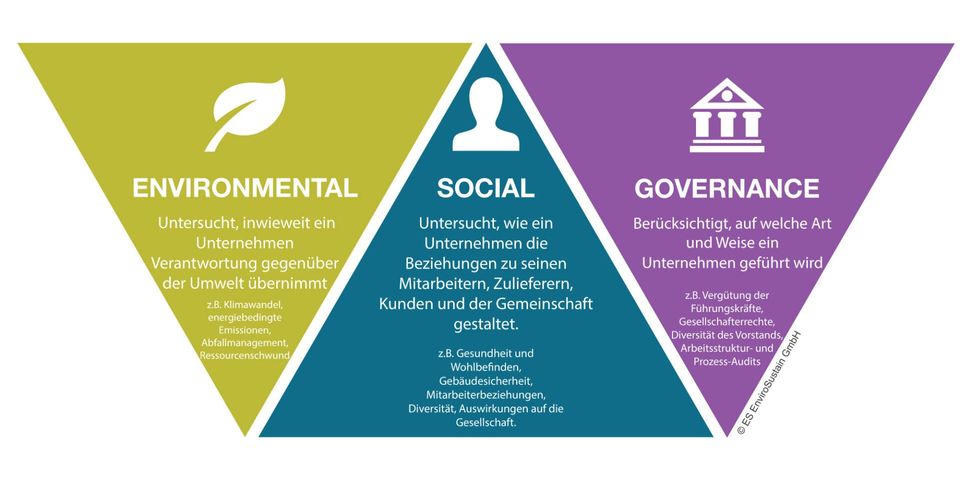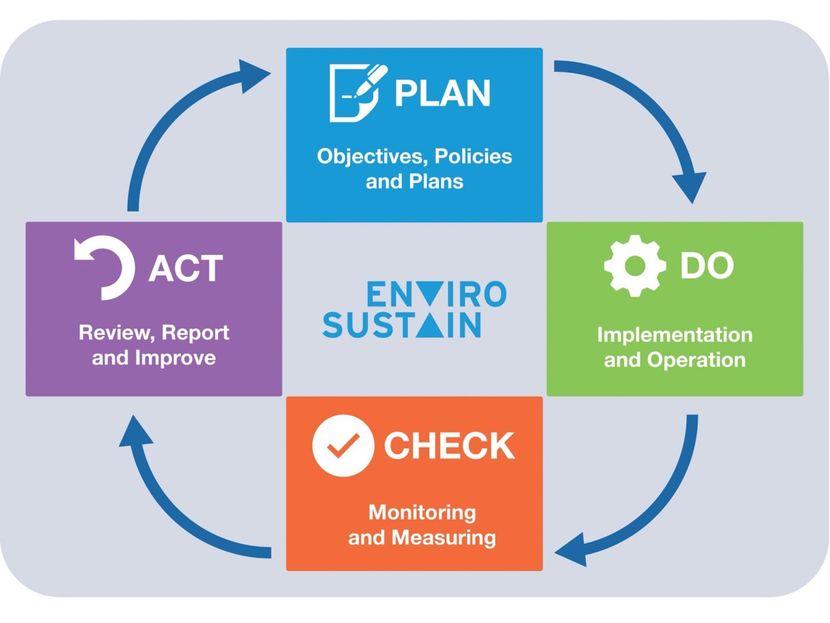ESG-Reporting: 5 Tipps für einen erfolgreichen Start
Was ist ESG?
ESG steht für Environmental, Social und Governance, auf Deutsch Umwelt, Soziales und Unternehmensführung. Bei diesen Kriterien handelt es sich um eine Reihe von Standards für die Geschäftstätigkeit eines Unternehmens, die sozial bewusste Investoren zur Prüfung potenzieller Investitionen verwenden.
Die ESG-Berichterstattung geht über die übliche Finanz- und Nachhaltigkeitsberichterstattung eines Unternehmens hinaus. Sie sollte die allgemeinen Unternehmensziele widerspiegeln und in Übereinstimmung mit Unternehmensvision, -mission und -werten stehen.
Wenn Sie mit dem Thema ESG noch ganz am Anfang stehen, wie sollten die ersten sinnvollen Schritte auf dem Weg zum erfolgreichen ESG-Reporting aussehen?
EnviroSustain's Top fünf Tipps zur erfolgreichen ESG-Berichterstattung:
1. Erarbeiten Sie eine ESG-Strategie
Die Berichterstattung über die von Büro-, Einzelhandels- oder anderen Dienstleistungsgebäuden erzeugten Emissionen setzt sich erst allmählich als etablierter Unternehmensstandard durch. Aus diesem Grund ist es besonders wichtig, eine fundierte Strategie zu entwickeln. Wie auch bei anderen Managementsystemen, geht die Verfolgung einer ESG-Strategie mit kontinuierlichen Verbesserungen einher. Eine fundierte ESG-Strategie orientiert sich in der Regel an folgenden Prinzipien:
PLAN - Formulieren Sie Ziele und entwickeln Sie entsprechende Pläne (analysieren Sie Ihre aktuellen Unternehmensprozesse, setzen Sie Gesamt- sowie Zwischenziele zur kontinuierlichen Überprüfung, und entwickeln Sie Pläne, um diese Ziele zu erreichen)
DO – Setzen Sie Ihre Pläne mithilfe eines übersichtlichen Managementsystems um
CHECK – Kontrollieren Sie die Ergebnisse mit Blick auf Ihre gesetzten Ziele
ACT - Verbessern Sie kontinuierlich Ihre Pläne, um Ihre geplanten Ergebnisse zu erreichen oder sogar zu übertreffen
(ISO 14001). WHAT IS THIS
2. Entscheiden Sie sich für das richtige Reportingformat
Da es eine Vielzahl von Rahmen, Standards und Richtlinien für die Berichterstattung gibt, mag es in einem ersten Schritt schwierig erscheinen, das passende Format auszuwählen.
Es gibt eine Anzahl allgemein ausgelegter Systeme, wie z.B. die Global Reporting Initiative (GRI) und die Sustainable Development Goals (SDGs). Andere wiederum sind themen- oder branchenspezifisch ausgerichtet, wie z.B. die International Standards Organisation (ISO) oder die auf die Klimawandel-Thematik ausgelegte Task Force on Climate-related Financial Disclosures (TCFD).
GRESB ist ein Standard, der speziell auf Investoren und Kunden der Immobilienbranche zugeschnitten ist und die Grundlage für den Großteil der Berichterstattung in dieser Branche bildet. Er bietet eine Bewertung der ESG-Performance von Immobilienanlagen weltweit, einschließlich Immobilienportfolios und Infrastrukturanlagen.
Beim Reporting gibt es keinen einheitlich anwendbaren Ansatz. Vielmehr wird dieses davon abhängig sein, welche Anforderungen Ihr Unternehmen an das eigene Reporting stellt und über welche Inhalte und für welche Zielgruppen Sie berichten. Informieren Sie sich daher umfassend zu dem für Sie am besten geeigneten Reporting oder nehmen Sie direkt Kontakt mit einem auf Ihre Branche spezialisierten Berater auf.
3. Stellen Sie die Zuverlässigkeit Ihrer Daten sicher
Um die Verlässlichkeit Ihrer Berichterstattung zu gewährleisten, müssen vor allem Ihre Daten verlässlich sein. Bei EnviroSustain mussten wir wiederholt feststellen, dass sich die Erfassung und Berichterstattung von zuverlässigen und qualitativ hochwertigen Nachhaltigkeits- und ESG-Daten aufgrund unzureichender Softwares und Systeme als schwierig gestalten kann.
Im November 2019 ging ES eine Partnerschaft mit Measurabl, der weltweit führenden ESG-Datenmanagementplattform für gewerbliche Immobilien, ein. Wir sind davon überzeugt, in Measurabl das richtige System gefunden zu haben, sowohl für unsere Berater als auch – und ganz wichtig – für unsere Kunden. Unabhängig von der Software oder des Systems, sollte jedoch die Qualität und Zuverlässigkeit der Daten immer an erster Stelle stehen.
Vor dem Hintergrund kontinuierlicher Bemühungen um hohe Datenqualität, rief GRESB zum Jahresende 2018 eine Technical Working Group (TWG) ins Leben, die die Entwicklung eines GRESB Performance Data Standard zum Ziel hatte. In Anerkennung seines ungebrochenen Engagements für qualitativ hochwertige ESG-Daten wurde Measurabl zum Gründungsmitglied dieser Arbeitsgruppe erkoren.
4. Transparenz im Reporting schaffen
Da ESG-Berichte und -Offenlegungen im Kontext von Investitions- und Anlageentscheidungen zunehmend berücksichtigt werden, ist es wichtig sicherzustellen, Ihren Stakeholdern auf transparente und sorgfältige Art und Weise Bericht zu erstatten.
Laut einem vor kurzem veröffentlichten Bericht sollte dabei Folgendes berücksichtigt werden:
- Entwickeln Sie konsistente Richtlinien für die Quantifizierung und Berichterstattung zweckgebundener Kennzahlen.
- Gleichen Sie externe Berichtskennzahlen an von der Geschäftsführung Ihres Unternehmens festgelegte Kennzahlen an.
- Präsentieren Sie Ihre Kennzahlen systematisch. Ziehen Sie die Nutzung von Technologien, die Ihnen helfen Informationen interaktiv und ansprechend zu gestalten, in Betracht.
- Bieten Sie aus Gründen der Einheitlichkeit Vergleichszahlen an.
- Entscheiden Sie sich für ein geeignetes Format und die Häufigkeit der Berichterstattung.
- Führen Sie Kontrollen der Erstellung und Berichterstattung von zielgebundenen Kennzahlen mit derselben Überzeugung wie Kontrollen der herkömmlichen Finanzberichterstattung durch.
- Berichten Sie aus dem Kontext heraus - die wichtigsten Kennzahlen berücksichtigen immer die eigene Branche und die relevanten Märkte des Unternehmens.
Stellen Sie darüber hinaus sicher, dass die angewandten Kennzahlen SMART (Specific, Measurable, Achievable, Realistic, Timescale) sind, um Fortschritte und Verbesserungen hervorzuheben. Dies kann durch die Bereitstellung eines kontextbezogenen Hintergrunds auch bei der Ausrichtung der Unternehmensaktivitäten an den ESG-Zielen helfen.
5. Einfach loslegen!
Führende Trends und Themen wie die Förderung von gesellschaftlichem Mehrwert und Impact Investing, sowie in der breiten Öffentlichkeit verankerte, aktuelle Anliegen zur Klimakrise und den Klimaneutralitätszielen rücken das Thema ESG auf der Tagesordnung weiter nach oben.
Aus diesem Grund können wir Ihnen nur empfehlen: fangen Sie noch heute mit Ihrem Reporting an! Eine Strategie und ein Format für Ihr Reporting festzulegen, bietet Ihnen den idealen Einstieg in die ESG-Berichterstattung.
Zu guter Letzt: Bei Fragen gibt es immer jemanden, der Ihnen weiterhelfen kann, einschließlich unserer Experten bei EnviroSustain. Sollten Sie Unterstützung benötigen, setzen Sie sich gerne mit uns in Verbindung – wir helfen Ihnen gerne weiter!









Head Office, Berlin,
Neue Grünstraße 17 | 18 Hof 1 | TRH 3
10179 Berlin
© ES EnviroSustain GmbH 2021






